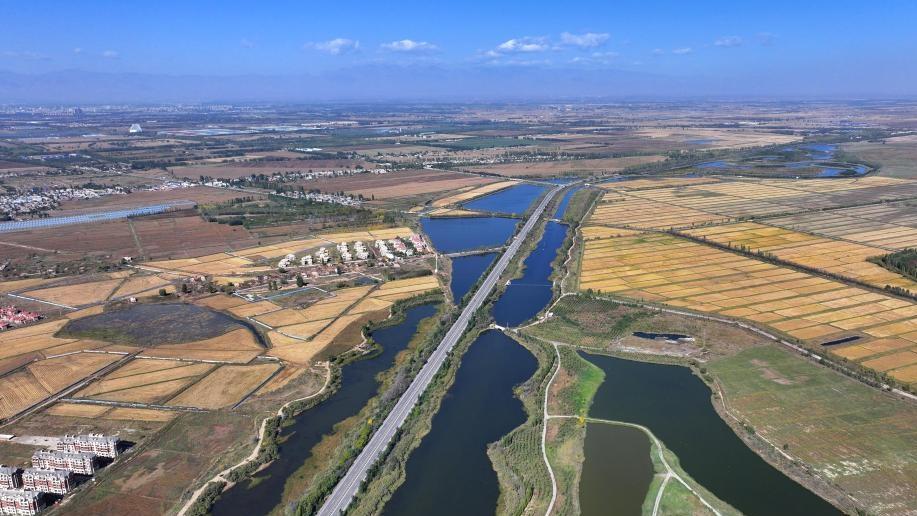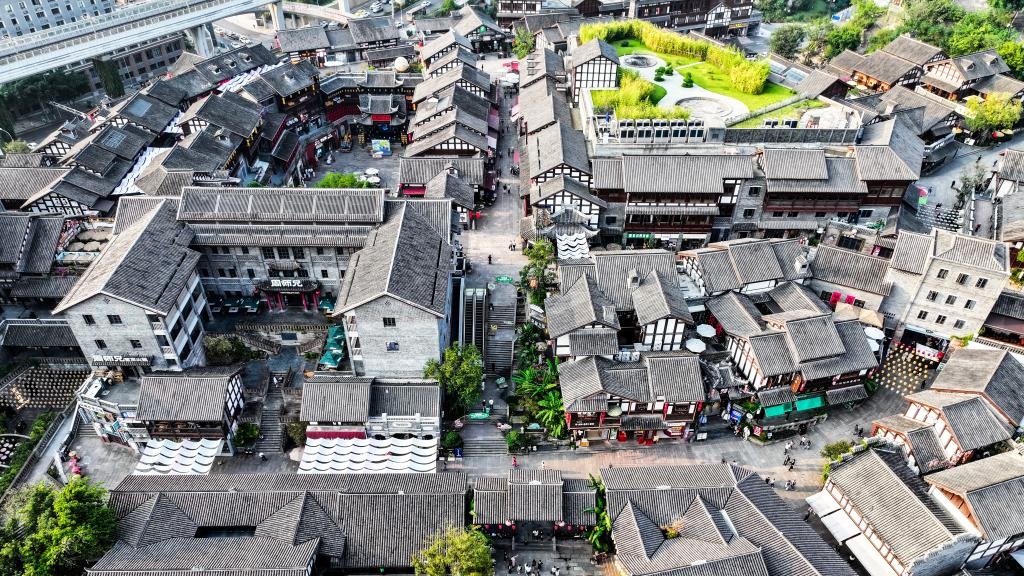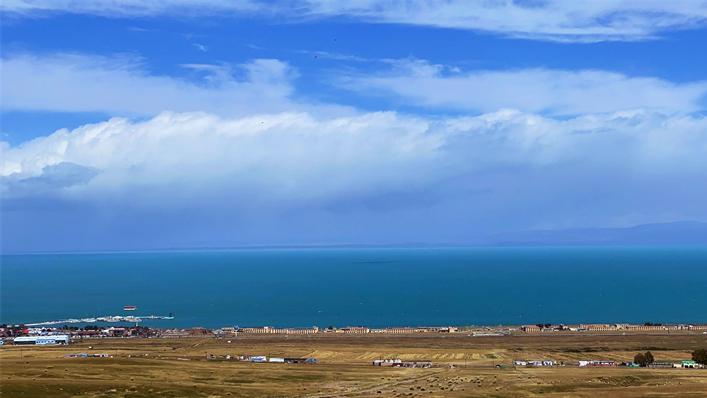Desolate deserts transformed into smart farms in NW China's Xinjiang

Guo Wei shows sweet wormwood he has planted at the Tianfu 400,000-kilowatt photovoltaic power base in Shihezi city, northwest China's Xinjiang Uygur Autonomous Region, on Sept. 23, 2024. (Photo/Cheng Xiaolu)
The Chinese people have overcome the challenges posed by the Gobi Desert, and saline and alkaline soil to convert them into productive farmland.
In agricultural parks and demonstration bases affiliated with the Xinjiang Production and Construction Corps (XPCC) in northwest China's Xinjiang Uygur Autonomous Region, a range of advanced technologies including drones, robots, smart greenhouses, and digital management systems are widely utilized. These innovative tools not only enable the cultivation of high-quality crops but also contribute to reduced energy consumption in agricultural processes.
Innovative cotton fields
"The cotton fields, spanning over 1,000 mu (about 66.67 hectares), are about to enter the harvest season, with the average yield per mu projected to reach around 500 kilograms and the profit from per mu of land expected to hit 1,500 yuan (about $212.39)," said Cao Senlin, deputy political commissar of the Fangcaohu Farm in Wujiaqu city, affiliated with the sixth division of the XPCC in Xinjiang.
There were only a few individuals working in the fields. "The Fangcaohu Farm has achieved mechanization in planting and harvesting cotton across all of its over 600,000 mu of fields, except for manually pruning the cotton plants," Cao explained, noting that they have started to introduce machinery for this task.
At the Moguhu Modern Agriculture Demonstration Base of Xinjiang Tianye (Group) Co., Ltd., affiliated with the XPCC in Shihezi city, innovative technologies and advanced equipment are driving agricultural advancements.
"Our independently developed drip irrigation system under plastic film has significantly boosted cotton yields to around 320 kilograms per mu of land in low-yielding saline and alkaline soil, surpassing some fertile farmland. Through over more than 20 years of practice and technological innovation, we have reduced electricity consumption in agricultural irrigation, promoting green and sustainable development," said Ma Zhandong, a senior engineer and general manager of Xinjiang Tianye (Group) Co., Ltd.

Ma Zhandong, a senior engineer and general manager of Xinjiang Tianye (Group) Co., Ltd., introduces sci-tech innovations of the company at its Moguhu Modern Agriculture Demonstration Base, on Sept. 23, 2024. (Photo/Cheng Xiaolu)
The company has developed a technology that desalinates the soil through underground tubes. When combined with fertigation, this technology can increase crop production by 30 percent.
The company utilizes agricultural drones to patrol the approximately 5,000 mu of cotton fields along a designated route. Adjacent to the drone landing area, a lineup of equipment including an underground water detecting system, smart pesticide monitoring lamps, a meteorological station, a cotton growth monitoring system, an underground water monitoring system and other equipment is installed. They gather information that is displayed on a large screen for the field manager to review and address various circumstances.
"Under the panel" wormwood
The Tianfu 400,000-kilowatt photovoltaic power base in Shihezi city is located on the edge of the Gurbantunggut Desert. The base has turned the desolate desert into farmland, specifically the harvesting of wormwood under the photovoltaic panels.
Guo Wei, who used to sell medicinal herbs, began cultivating sweet wormwood on 32 mu of land at the base this June with his friend. They harvested the plant in August and will do so again in October. "We operate on an order-based production model and are confident in the plant's sales. We anticipate a net profit of around 1,500 yuan per mu from the sweet wormwood field," Guo stated, mentioning his intention to expand the planting area to 100 mu for growing additional medicinal herbs.
"Smart" tomatoes
Truss tomatoes grown at a smart greenhouse of Runtai Smart Agriculture Industrial Park in Kokdala city, Xinjiang have helped the local community gain wealth.

Yiliziranmu Aili picks truss tomatoes at a smart greenhouse of Runtai Smart Agriculture Industrial Park in Kokdala city, northwest China's Xinjiang Uygur Autonomous Region, on Sept. 24, 2024. (Photo/Cheng Xiaolu)
Runtai Agriculture Technology Development Co., Ltd. initiated trial planting of truss tomatoes in June 2023, and currently, it cultivates 90,000 truss tomato plants, said Tang Yue, the company's executive director. Utilizing soilless cultivation, drip irrigation, and digital technology for real-time monitoring, early warning, and environmental control, tomato production is now independent of natural environmental constraints, enabling year-round market supply.
"In May, we achieved our first truss tomato harvest. To date, we have harvested over 600 tonnes of truss tomatoes, with sales nearing 10 million yuan," Tang said, adding that this year, an estimated 1,350 tonnes of truss tomatoes will be harvested, resulting in an annual sales volume of 24 million yuan.
In addition to truss tomatoes, the park cultivates other fruits across an area spanning 250 mu, providing employment opportunities for over 100 individuals from diverse ethnic backgrounds.
Elzirem Eli, a 25-year-old member of the Uygur ethnic group, joined the company last year. "I secured this job right after graduating, and I am content with my role, which aligns with my horticulture major," she expressed. Her responsibilities involve tending to the truss tomato plants and fruits according to their growth stages.
Elzirem Eli has progressed to a team leader position, now earning a monthly salary of 5,000 yuan, up from 4,000 yuan when she started.
Photos
Related Stories
- Xinjiang launches freight train for vehicles to Central Asia
- 2024 World Agrifood Innovation Conference (WAFI 2024) convenes in Beijing
- Girl shows off stunning spinning skills
- Chinese, foreign experts call for agricultural sci-tech innovation to combat climate change
- Xinjiang's protection of blue skies shows China's determination to air-pollution control
Copyright © 2024 People's Daily Online. All Rights Reserved.









